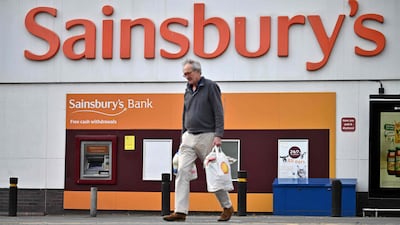Britain’s economy grew at the slowest pace for a year at the start of 2022 sending the pound sliding to its lowest in two years against a buoyant US dollar and a seven-month low against the euro.
Sterling fell more than 1 per cent to $1.2185 at one stage of Thursday trading and 0.4 per cent down at 1.166 euros..
The Office for National Statistics (ONS) said gross domestic product (GDP) rose by a weaker-than-expected 0.8 per cent between January and March, down from growth of 1.3 per cent in the previous three months and the weakest since the first quarter of last year.
The figures showed that on a monthly basis, GDP fell by 0.1 per cent in March after growth stalled in February – revised down from the 0.1 per cent previous growth estimate – and rose by 0.7 per cent in January.
Above pre-pandemic level
While the expansion means GDP is now 0.7 per cent above levels seen before the pandemic struck, the figures are likely to mark the calm before the storm as warnings grow over a recession in the UK due to the cost-of-living crisis.
Darren Morgan, director of economic statistics at the Office for National Statistics (ONS), said: “The UK economy grew for the fourth consecutive quarter and is now clearly above pre-pandemic levels, although growth in the latest three months was the lowest for a year.”
He added: “Our latest monthly estimates show GDP (gross domestic product) fell a little in March, with drops in both services and in production.
“Construction, though, saw a strong month, thanks partly to repair work after the February storms.”
The Bank of England hiked in interest rates to a 13-year high of 1 per cent last week to try to curb inflation and warned the economy was set to stall in the second quarter, before contracting in the final three months and going into reverse overall in 2023.
While it said the UK was set to avoid a technical recession – defined as two quarters in a row of falling GDP – governor Andrew Bailey said growth would be “very weak”.
In a grim set of forecasts, the bank predicted that household income would suffer the second biggest decline on record this year, with inflation expected to peak at more than 10 per cent in October.
The National Institute of Economic and Social Research (Niesr) think tank predicted on Wednesday that the UK would fall into recession, forecasting a GDP contraction in the third and fourth quarters.
Chancellor Rishi Sunak said UK first quarter growth was faster than the US, Germany and Italy.
But added: “I know these are still anxious times.”
“Our recovery is being disrupted by Putin’s barbaric invasion of Ukraine and other global challenges, but we are continuing to help people where we can,” he said.
The figures showed the wind down of the coronavirus test and trace programme weighed on first quarter growth.
In March, the decline was led by a 0.2 per cent fall in output from the all-important services sector, with consumer-facing services down 1.8 per cent in a sign of the pressure already being felt among households.


